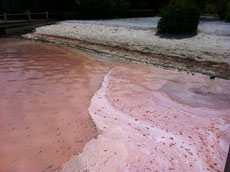The Maldives Marketing and Public Relations Corporation (MMPRC) has appointed staff to target specific markets for the tourism industry, in a bid to reach one million tourist arrivals in 2012.
The markets to be targeted included Italy and Japan (Ibrahim Asim), Germany and Switzerland (Fathimath Afra), UK, China and Korea (Fathimath Raheel), Russia and France (Najumulla Shareef), Spain (Fathimath Arushee), India (Aishath Rimna) and the Middle East (Mariyam Rasheed).
In a press conference on Monday, newly-appointed Deputy Minister of Tourism Mohamed Maleeh Jamaal – previously Secretary General of the Maldives Association of Travel and Tour Operators (MATATO) – said the corporation intends to launch several campaigns and PR activities in major tourist arrival markets to the country.
“We have about 102 resorts and around 26,000 beds. If each resort sets a target of bringing three more tourists to each bed, or 77 more tourists than the number that booked the resorts last year, we would easily reach the target,” Jamaal said.
He said the corporation plans to conduct joint promotion campaigns along with the tour operators and resorts, and had segmented itself to target each market.
The MMPRC revealed that it had been given a budget of Rf 70 million (US$4.5 million) to conduct marketing activities for the year.
Jamaal said that the budget for last year had been US$2.3 million, and with that budget they the country had seen the tourist arrivals of around 900,000.
“So this year, with this budget, we are confident that we can reach the target,” Jamaal said.
Jamaal expressed disappointment over the UK-based NGO Friends of Maldives (FOM)’s travel advisory, asking that potential tourists consider the idea of being a “responsible traveller” by avoiding specific resorts owned by people allegedly involved “in the subversion of democracy, and human rights abuses in the Maldives”.
“We are disappointed because, the tourism industry contributes 70 percent of every hundred rufiya every citizen of this country earns, which means from every hundred rufiya, 70 rufiyaa comes from the tourism sector. So every impact on the country’s tourism sector impacts the general living of the people,” Jamaal said.
“I think those who conducts these activities really envy the [success of] the industry. This is very sad. But we have the plans, and the capacity to overcome such negative campaigns, and therefore we will face every challenge and we will overcome that as well,” he claimed.
Regarding a reported recommendation from the International Monetary Fund (IMF) that the Maldives increase the bed tax levied on the tourism industry because of the state of the economy, and a comment made during a meeting of parliament’s public finances committee about the decline of the Chinese tourism market, Jamaal said that the tourism ministry did not forecast that the decline would continue.
“The Chinese market is improving. Our [predictions] do not show that the Chinese market will decline to the extent the IMF has said, and we had a positive growth in the last three months. This gives evidence to it,” he said.
Chinese tourist arrivals dropped by 34.8 percent to 12,237 in February compared to the same point last year, according to Asian travel trade newspaper TTG. Around 6,500 fewer tourists arrived from China last month, largely due to the cancellation of charter flights, which are expected to resume in April.
Asked about the impact media coverage of the political instability was having on the Maldives’ reputation as a safe and stable tourism destination, Jamaal acknowledged that certain international media coverage had negatively affected tourism.
However Jamaal said he believed the situation would not significantly impact tourist interest in the Maldives as a holiday destination.
“Our efforts to counter the bad image given out by the international media will help us recover the decline,” he said.
“In order to consolidate the Chinese market, a senior delegation consisting of key government officials and members of the MMPRC, in partnerships with Mega Maldives Airlines, had decided to go to four major cities in China to meet the authorities, tour operators and journalists.
“We will build awareness in China about what has happened in the Maldives, and I am sure that after that the Chinese market will improve further,” Jamaal added.
“However, we do not believe that the Maldives will be significantly affected by these negative headlines as the destination remains popular in our major source markets like Europe. Despite the economic slowdown that has taken place across the EU, we have seen positive growth.”
Reverting back to Sunny Side of Maldives
Jamaal announced that the country would be reverting back to its former branding ‘Maldives: the sunny side of life’, instead of the ‘Always Natural’ branding introduced under Nasheed’s government.
Jamaal told Minivan News that the decision to revert back to the Sunny Side of Life branding was based on “a number of questions and research the industry had about adopting a new corporate identity for Maldives tourism.”
“At the time of the rebranding we had to ask ourselves certain questions; such as do we have the budget to support a new brand identity? Was it the best time to introduce a new message?” he said. “The Maldives like many nations around the world is facing an economic crisis.”
Jamaal claimed that relying on a strong and established brand was the best direction at present for tourism marketing, but suggested it would be “enhanced” into subcategories such as “Maldives: the Spiritual Side of Life” to promote spa operations.
“This year instead of more generic messages, we will have specific focuses on certain sectors to mirror the efforts of the country’s tourism industry,” Jamaal said.
MMPRC was established during the time of former president Mohamed Nasheed to spearhead the country’s public relations and marketing strategy, replacing the former Maldives Tourism Promotion Board (MTPB).
Likes (0)Dislikes
(0)Dislikes (0)
(0) 